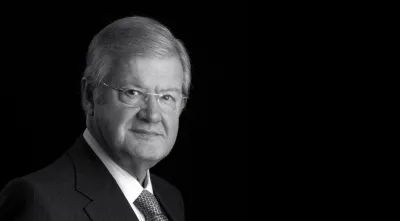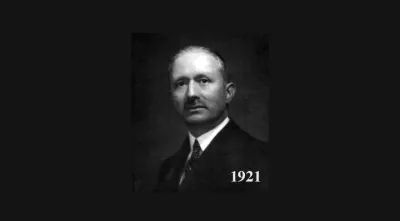«What does the Foundation mean to my family and to me in particular?
It was the form chosen to study major national issues and make civil society aware of them, thus encouraging debate and discussion among its members.
We desire a society that is receptive to culture, conscious of its own problems and the most appropriate solutions for them; an active society that professes, without fear, its thoughts, its critical opinions, and its wishes in total freedom.
A society aware of its rights, as well as its duties and one which shoulders its responsibilities; one which forces its politicians and government to listen to it and make decisions based on what that society wants.
With the Foundation it created, my family also wishes to give back to our society and country what it has received from them in equal measure. May those who represent it be worthy of its intentions!»
Alexandre Soares dos Santos (1934-2019)

Francisco Manuel dos Santos was born in Safurdão, 23 km from Guarda, in the Beira Alta region of Portugal, in 1876. His direct descendants are the shareholders of Sociedade Francisco Manuel dos Santos. This family company currently controls 56.14% of Jerónimo Martins.
The patron of the Francisco Manuel dos Santos Foundation went to primary school and was only 10 years old when he left his native village. He would never again experienced formal education. Responding to the appeal of a grocer who was looking for a boy who could read, write and do sums, Francisco Manuel dos Santos was sent to Porto.
The city was then going through its most significant period of growth in the modern age, and the young man did not hesitate in taking advantage of the opportunities this brought. Abandoning the position of grocer's assistant, he set himself up in the same line of business.
Highly successful, he made his fortune and developed a network of useful professional contacts, making the acquaintance of Elísio Pereira do Vale. In 1920, together with Domingos Gomes, they set up Grandes Armazéns Reunidos, with headquarters in Porto.
He transferred a significant part of his business to Lisbon in 1921. Along with his partners from Grandes Armazéns Reunidos, he acquired the Jerónimo Martins "fine grocery store” in Chiado, Lisbon. This grocery, founded in 1792 by a Galician of the same name, sold sophisticated national and foreign products, including the olive oil produced by famous Portuguese writer Alexandre Herculano. The store was a supplier of the Portuguese Royal House and was recognised with a Royal Warrant of appointment.
At the time of the acquisition, Estabelecimentos Jerónimo Martins & Filho was faced with serious financial problems due to management issues and the devastating consequences of the war. Restructuring was assured by a loan from Banco Borges & Irmão, which accepted the "business and honour" of Francisco Manuel dos Santos as collateral.
The strategy adopted provided for a slow and steady recovery; a chain of retail stores was set up, storage was reorganised and activities related to non-food products were eliminated. Steadily, Estabelecimentos Jerónimo Martins & Filho recovered its financial security and became one of the first companies in the country to pay its workers a 13th-month salary, as well as building a staff canteen in the headquarters in Chiado.
In the mid-1930s, there was expansion into industry, which meant investment in a margarine factory, a product that was both scarce and essential. Elísio Alexandre dos Santos, nephew and son in-law of Francisco Manuel dos Santos, who was in the business since 1935, took the initiative to build FIMA - Fábrica Imperial de Margarina. FIMA was incorporated in association with Silva Torrado, although the operation in Sacavém was only inaugurated in 1944, given that the World War prevented the arrival of the equipment. A devastating fire not long after put an end to its troubled existence, and construction then began on a new factory in Santa Iria da Azóia, which is still operating to this day.
The survival of the firm was due to Unilever, whose brands Jerónimo Martins had been selling since 1926 and with which it went into a joint venture in 1949. Having acquired the Silva Torrado share, 60% of FIMA went to Jerónimo Martins; the remainder was reinstated through the setup of Lever, a company producing cleaning and personal hygiene products, in which Unilever had an equivalent share.
Francisco Manuel dos Santos died in 1953, but not before having set up Sociedade Francisco Manuel dos Santos (SFMS) with his seven children in 1941, with the aim of formalising his holdings in several companies. His heirs assured the continuity of the company and reorganised the Group.
Elísio Alexandre dos Santos suceeded him. His management style favoured the group’s manufacturing side. It was under his leadership that Olá Ice Cream factory was acquired and that the family businesses expanded to Angola, where he founded Socorel, Sociedade Colonial de Representações. He would die in Brazil in 1967 while visiting his son – Alexandre Soares dos Santos, who 10 years before had started a career as marketing trainee in Unilever, Germany.
After the death of Elísio Alexandre dos Santos, the friendly intervention of the then vice-president of Unilever, who had been following the international career of Alexandre Soares dos Santos closely from the start, played a decisive role in influencing his return. After his demands for clear executive powers were made plain and agreed to, Alexandre Soares dos Santos finally entered the family business.
In 1980, the first Pingo Doce supermarket was opened; that year marked the return of Jerónimo Martins to the small-scale grocery business on the Rua Garrett, which quickly became an extensive network of large stores. In 1989, the Francisco Manuel dos Santos family acquired – after seven decades in business – the Vale family's share in Jerónimo Martins. The operation was financed by a flotation (initial public offering) of part of the company's capital on the Stock Exchange.
Alexandre Soares dos Santos was responsible for the Group’s investment in the distribution sector and led the exponential growth of the business over four decades, making it thrive, while overcoming several political and economic crises that Portugal faced. He developed the distribution business beyond Portugal and successfully led the internationalization of Jerónimo Martins into Poland and Colombia. It was under his leadership that Jerónimo Martins became one of the 100 largest retailers in the world. His deep concern with citizenship led SFMS to create Fundação Francisco Manuel dos Santos and the Oceano Azul Foundation.

Sociedade Francisco Manuel dos Santos (SFMS) is now in its fourth generation. Today, it is an international family holding company that operates mainly in Portugal, Poland, Colombia and Brazil. With investments in the areas of distribution, the agrifood industry, specialised retail, healthcare, citizenship and the environment, it employs more than 134,000 people and serves around 300 million consumers on a daily basis.
Supported by its current shareholders, the heirs of the founder, the mission of SFMS is to create value in its companies, contributing to the personal and professional development of its staff and investing in the communities where its companies operate.
Its main asset is a controlling stake at Jerónimo Martins, an international group based in Portugal, which is now the 49th largest retailer in the world, according to "Global Powers of Retailing, 2022”, a study carried out by the consultancy firm, Deloitte. It operates in Portugal (Pingo Doce and Recheio, Jeronymo coffee shops, Hussel confectioneries and Jerónimo Martins Agroalimentar); in Poland (Biedronka, the leading food retailer in the country, and Hebe health and beauty stores); and in Colombia (Ara stores).
SFMS has been in a historical joint venture with Unilever since 1949, which now includes Unilever FIMA and Gallo Worldwide. SFMS also holds JMD, a company operating in the representation and distribution of various brands in the food sector, NAZ ice creams and miMed health clinics.
In addition to managing its holdings in distribution and in industry, SFMS also invests in new companies operating in the food retail value chain, having set up the holding company Movendo Capital to this end in 2017.
SFMS has been consolidating its pillar devoted to citizenship activities, under which it set up the Francisco Manuel dos Santos Foundation in 2009, aimed at strengthening civil society through study, disclosure and debate of the Portuguese reality, promoting human rights and democracy.
SFMS reinforced its environmental responsibility pillar in 2015, when it aquired the concession for Oceanário de Lisboa, and again in 2017, with the launch of the Oceano Azul Foundation, devoted to the sustainability of the planet through protecting the oceans.
SFMS has played an active role in society since its foundation. With a social responsibility policy based on values like integrity, respect, responsibility, credibility and transparency, it works to support several social causes and its priority areas of action are education, human dignity, the environment and health.
Taking the Group as a whole, of note in the area of education is the support given to the Alfredo de Sousa Foundation for the construction of the NOVA SBE campus in Carcavelos. In terms of human dignity, there is the setup of the Biedronka Foundation in Poland (whose mission is to help the elderly people of Poland to live with dignity and health for as long as possible), as well as the donation of food and other products to institutions providing support to the more vulnerable segments of the population, such as the Food Bank in Portugal, the Federation of Polish Food Banks and Caritas Poland, and the Colombian Association of Food Banks and Caritas Colombia.
During the COVID-19 pandemic, the SFMS holding company and the group of companies reinforced their support for the more exposed groups, including the health professionals on the frontline, the children who couldn't go to school, the elderly and people in institutions, either through monetary support or the donation of food products.
SFMS established a partnership with the João Lobo Antunes Institute of Molecular Medicine (iMM) and granted monetary support, along with the Jerónimo Martins Group, that made it possible to implement an organisational and research structure at iMM dedicated to this disease. This support made it possible to develop the National COVID-19 Serological Panel and implement the new COVID-19 Molecular Diagnostic Centre at iMM.
In 2022, given the serious military and humanitarian situation in Ukraine, the group set to work immediately and, a little over a week after the beginning of the conflict, conceded a total sum of €9,5 million to various polish entities working on the ground. SFMS made a donation to the Biedronka Foundation for the immediate setup of a free temporary accommodation programme for the Ukrainian refugees most in need. This support was in addition to the contribution made by the Jerónimo Martins Group, distributed equally between the Polish Red Cross, Caritas Poland, Polish Humanitarian Action, the Polish Medical Mission and SOS Children's Villages in Poland, as well as food and non-food aid for the refugees provided by Biedronka and the Biedronka Foundation.
Throughout its history, SFMS has sought to remain faithful to the values of its founder.
In the future, growth, sustainability, and citizenship will continue to be the main guidelines for SFMS investments and actions.